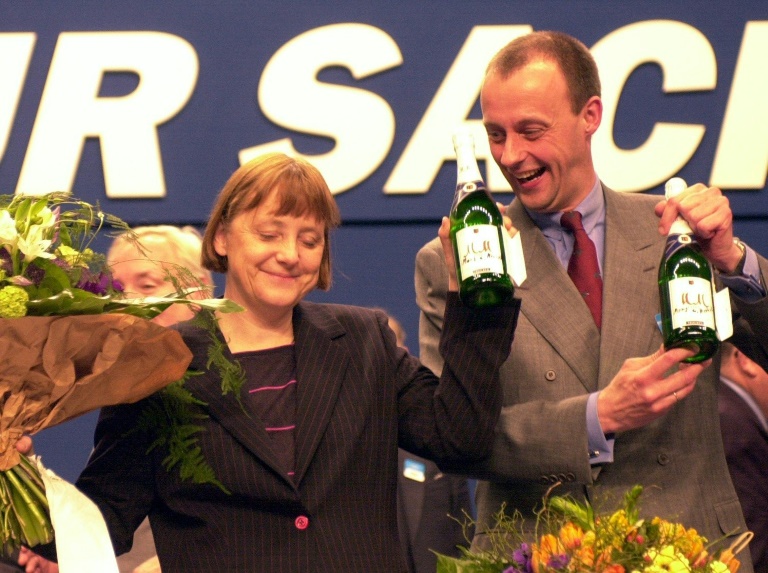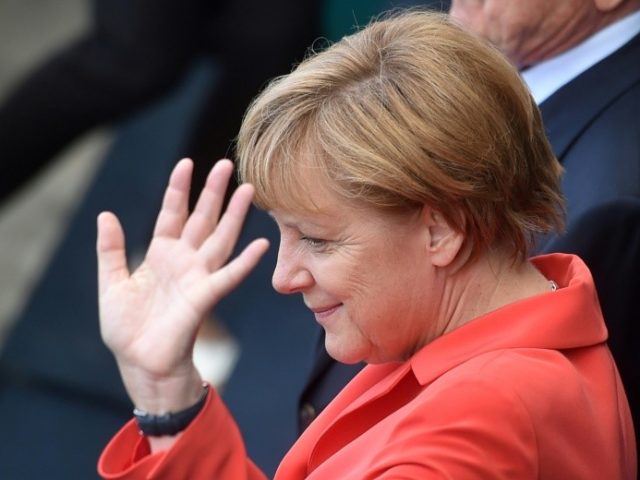While German Chancellor Angela Merkel believes she will be able to lead Germany for over a year after stepping down as leader of the nation’s largest party it is not a plan popular with the majority of Germans, with 62 per cent saying she should step down before the next election.
When Angela Merkel — who will mark 13 unbroken years as German Chancellor (Prime Minister equivalent) in just two weeks’ time — suffered yet another blow in a line of electoral setbacks last month, she announced she would relinquish the leadership of her party as well as her country.

Angela Merkel stands alongside her party’s parliamentary group leader Friedrich Merz after being elected as the new leader of Christian Democratic Union in April 2000 / AFP Image
Dr Merkel will step down from the Christian Democratic Union (CDU) in December at the party’s annual conference, but against her own previous insistence that the two roles should go together, said she wants to continue as Chancellor until the next German election in 2021.
Following her recent embarrassing election results with almost another two years in power would not be popular with voters, however, a new poll conducted for German newspaper Bild reveals. The survey suggests 62.2 per cent of Germans think Dr Merkel should resign shortly after stepping down from her party leadership — at the beginning of 2019 — so Germany can have a new Chancellor.
The figure resembles a significant rise over a similar poll taken in December 2017, when Breitbart London reported 47 per cent of Germans surveyed said they wanted Merkel to stand down before 2021.
The CDU will select a new party leader at the December conference, and as reported by Breitbart London those vying to take the top job in German politics are seeking to differentiate themselves from the outgoing chancellor — and each other — through comments on the forthcoming United Nations migration pact. The Merkel Chancellorship has been one defined for many by the issue of mass migration to Europe, and Federal Minister of health Jens Spahn has been a vocal critic of the controversial UN plan.
“The debate on the migration pact is still pending in the parliamentary group,” Spahn said, remarking: “It is important that Germany retains its sovereignty to control and limit migration.”
So-called Merkel protege or “mini-Merkel” and CDU Secretary-General Annegret Kramp-Karrenbauer is thought of as the favourite to replace the Chancellor and has also recently made her views on immigration politics known, lashing out at leaders to the right of the CDU who suggested building a local coalition with the anti-mass migration Alternative for Germany (AfD) party. She said in September, leaving no room for doubt: “There will be no cooperation or coalition with the AfD.”
The scramble to succeed Merkel was triggered in October after the Chancellor’s CDU party recorded a poor performance in local elections in Hesse, with insurgent parties the AfD and the Greens both breaking through with significant rises in support. This followed another bad result for Merkel’s Bavarian sister party in early October, getting their worst polling in a state they have historically dominated in decades.
Most damaging of all perhaps was Angela Merkel’s performance in the German national elections in 2017, which saw her party achieve its worst result since the Second World War. The new highs achieved by the AfD were seen as a particular indictment for Merkel’s performance.
AfD politician Alexander Gauland spoke after the vote of his near-term ambitions, telling a crowd of supporters: “Dear friends, now that we’re obviously the third biggest power … the government has to buckle up. We will hunt them. We will hunt Ms Merkel … and we will reclaim our country and our people.”
Oliver JJ Lane is the editor of Breitbart London — Follow him on Twitter and Facebook

COMMENTS
Please let us know if you're having issues with commenting.